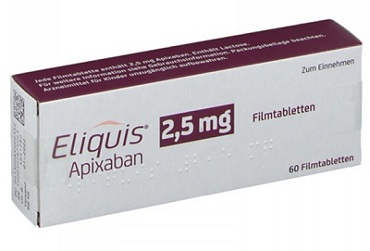Outpatients With COVID-19 Who Were On Outpatient Blood Thinners At The Time Of Diagnosis Experienced A 43 Percent Reduced Risk Of Hospitalization
Source: Blood Thinners-COVID-19 Oct 02, 2021 3 years, 6 months, 3 weeks, 3 days, 5 hours, 57 minutes ago
Blood Thinners-COVID-19: A new study by researchers from University of Minnesota-USA and Basel University-Switzerland has found that outpatients with COVID-19 who were on outpatient blood thinners at the time of diagnosis experienced a 43% reduced risk of hospitalization.

The study focused on COVID-19 positive patients who have been taking prescribed anticoagulant class rugs including warfarin, a direct oral anticoagulant or DOAC such as apixaban, rivaroxaban, dabigatran, edoxaban), and enoxaparin in the immediate 90 days prior to COVID-19 diagnosis.
The study involved a total of 6195 patients, 598 were immediately hospitalized and 5597 were treated as outpatients. The overall case-fatality rate was 2•8% (n = 175 deaths). Among the patients who were hospitalized, the inpatient mortality was 13%. Among the 5597 COVID-19 patients initially treated as outpatients, 160 (2.9%) were on anticoagulation and 331 were eventually hospitalized (5.9%).
In a multivariable analysis, outpatient anticoagulation use was associated with a 43% reduction in risk for hospital admission, HR (95% CI = 0.57, 0.38–0.86), p = 0.007, but was not associated with mortality, HR (95% CI=0.88, 0.50 - 1.52), p = 0.64. Inpatients who were not on anticoagulation (before or after hospitalization) had an increased risk for mortality, HR (95% CI = 2.26, 1.17–4.37), p = 0.015.
Hence, the study findings showed that outpatients with COVID-19 who were on outpatient anticoagulation at the time of diagnosis experienced a 43% reduced risk of hospitalization. Failure to initiate anticoagulation upon hospitalization or maintaining outpatient anticoagulation in hospitalized COVID-19 patients was associated with increased mortality risk.
The study findings were published in the peer reviewed journal: EClinical Medicine by Lancet.
https://www.thelancet.com/journals/eclinm/article/PIIS2589-5370(21)00419-3/fulltext
The US NIH has reported that many individuals with COVID-19 develop abnormal blood clots from high inflammation, which can lead to serious health complications and mortality.
In order to find ways to decrease clotting related to COVID-19, the study team looked at reducing hospitalizations by using prescribed blood thinners.
Lead author Dr Sameh Hozayen, MD, MSC, an assistant professor of medicine at the University of Minnesota Medical School told Thailand
Medical News, "We know that COVID-19 causes blood clots that can kill patients. But, do blood thinners save lives in COVID-19? Blood thinners are medications prescribed to prevent blood clots in patients with a prior blood clot in their lungs or legs. They also prevent blood clots in the brain secondary to abnormal heart rhythms, like atrial fibrillation. Blood thinners are the standard of treatment in these diseases, which is why we looked at data to see if it impacted hospitalizations related to COVID-19."
Dr Hozayen further added, "We already know that overwhelmed hospitals have a higher risk for death among their patients, so reducing hospitalization may have a positive impact during a COVID-19 surge.
"
Importantly the study found that:
-1) Individuals on blood thinners before having COVID-19 were admitted less often to the hospital, despite being older and having more chronic medical conditions than their peers;
-2) Anti-Coagulants or blood thinners regardless of if they are being used before being infected with COVID-19 or started when admitted to the hospital for treatment of COVID-19 reduce deaths by almost half.
-3) Severely ill and hospitalized COVID-19 patients benefit from blood thinners regardless of the type or dose of the medication used.
Dr Hozayen added, "Unfortunately, about half of patients who are being prescribed blood thinners for blood clots in their legs, lungs, abnormal heart rhythms or other reasons, do not take them. By increasing adherence for people already prescribed blood thinners, we can potentially reduce the bad effects of COVID-19.At Minnesota Health Fairview and most centers around the world now, there are protocols for starting blood thinners when patients are first admitted to the hospital for COVID-19as it is a proven vital treatment option. Outside of COVID-19, the use of blood thinners is proven to be lifesaving for those with blood coagulations conditions."
Utilizing de-identified data from Minnesota Health Fairview and after obtaining appropriate ethical committee approval.
The study was a collaborative effort between University of Minnesota Medical School faculty (Chris Tignanelli, Michael Usher, Zachary Kaltenborn, Surbhi Shah, and Diana Zychowski); University of Minnesota School of Public Health faculty (Ryan Demmer, Pamela Lutsey, and Sydney Benson); and Basel University Pathology Institute faculty (Alexander Tzankov and Jasmin Haslbauer).
The study team note that the next steps for this work is to ensure that the results of this study are consistent and not isolated to the health care systems in advanced countries like the United States and Switzerland or in certain populations, like Caucasians. They are currently working with research groups in other parts of the world, like Egypt, to look at how blood thinners impact patients in less-invested health care systems and in different patient populations.
Thailand Medical News would like to add many other studies have shown that other blood thinners like aspirin also help in reducing risk of COVID-19 disease severity and also COVID-19 mortality.
https://www.thailandmedical.news/news/american-study-confirms-that-aspirin-use-is-associated-with-decreased-mortality-risk-in-covid-19-patients
https://www.thailandmedical.news/news/american-study-shows-that-taking-low-dose-aspirin-decreases-risk-of-severity-and-mortality-when-infected-with-covid-19
https://www.thailandmedical.news/news/breaking-university-of-maryland-study-shows-that-aspirin-use-reduces-risk-of-both-mortality-and-mechanical-ventilation-in-hospitalized-covid-19-patien
https://www.thailandmedical.news/news/breaking-american-and-german-study-shows-that-heartburn-drug-famotidine-with-aspirin-prevents-covid-19-disease-severity-and-mortality
However do not take aspirin without consulting a licensed medical doctor first as it can sometimes be fatal for certain individuals due to internal bleeding that aspirin is known to cause.
For more on
Blood Thinners-COVID-19, keep on logging to Thailand Medical News.
